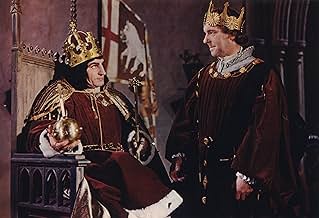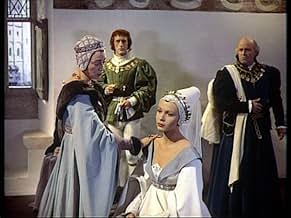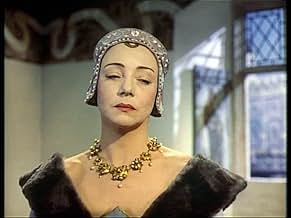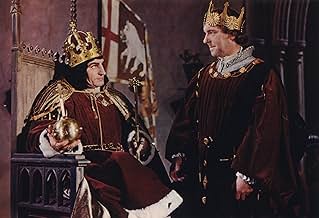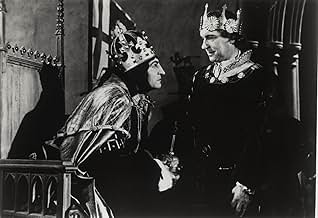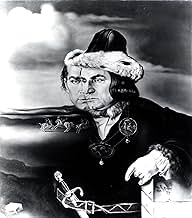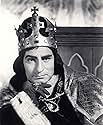Il potente racconto di Shakespeare del malvagio e deformato Re e delle sue conquiste, sia sul campo di battaglia che nella camera da letto.Il potente racconto di Shakespeare del malvagio e deformato Re e delle sue conquiste, sia sul campo di battaglia che nella camera da letto.Il potente racconto di Shakespeare del malvagio e deformato Re e delle sue conquiste, sia sul campo di battaglia che nella camera da letto.
- Regia
- Sceneggiatura
- Star
- Candidato a 1 Oscar
- 9 vittorie e 3 candidature totali
- Monk
- (as Wally Bascoe)
Recensioni in evidenza
In Richard III, Olivier constantly turns and talks to the audience with his devilish plans to ascend to the throne of England. Aided by his cousin the Duke of Buckingham (Ralph Richardson) he soon replaces King Edward IV (Cedric Hardwicke), rids himself of his other brother George (John Gielgud) and dispatches his young nephews to the tower and then brings their tender lives to a premature end.
The deformed, despicable hunchback even seduces the widow of a man he murdered for his own purposes, Lady Anne (Claire Bloom).
Once Richard ascends to the throne he finds that he has to do battle with a rival who also stakes a claim to the hollow crown.
This is a chance to see Olivier, still in his pomp speaking the Bard's verse. Unfortunately the accompanying music is too bombastic and Olivier's death scene verges on the ham.
The movie is beautiful, rich; the costumes are awesome; and the dialogue, of course, is wonderful. He patches in that great speech from Henry VI, part 3: "Why, I can smile, and murder whiles I smile . . .": and the movie wouldn't be right without it.
The other actors, Britain's elite of the time, seem to be tyrannized by the boss; and the text should have been edited better, because if you don't know the play and practically the whole history you'll get lost. Not to worry, though; the subplots here aren't really important (but they should be), and the thundering battle at the end will leave you satisfied. Special mention of Sir William Walton's music, the vibrant colors, and of course, England itself.
It's less 'cinematic' than either "Henry V" or "Hamlet", (the sets look like sets), but here 'the play's the thing' and Olivier cast it perfectly. Knights Gielgud and Hardwicke are quickly dispatched as Clarence and Edward but Ralph Richardson is a magnificently malevolent Buckingham, Mary Kerridge, a magnificent Queen Elizabeth and Claire Bloom, a sublime Lady Anne. It is also one of the most accessible of all Shakespeare adaptations; Shakespeare for those who don't like Shakespeare and a 'thriller' that genuinely thrills.
Quite well. Because "Richard III," like "Patton" or "Scarface," is essentially a one-man show, and Olivier was the best Shakespearean actor of his time or since, we are in good hands. As a director (and uncredited co-writer), Olivier telescopes the action on screen in such a way as to negate the necessary stageiness of Shakespeare's text. He moves us the audience from one scene to another by pulling back a curtain and nodding to us to come closer, as if we were an old friend. He yells some lines, then coos others, his vocal dynamics challenging even seasoned readers of the play in terms of what he chooses to accent and what he does not. Finally, he finds the ample stores of humor Shakespeare gave this, one of his darker plays.
"A sweeter and a lovelier gentleman...the spacious world cannot again afford," Richard says of one man he killed, and Olivier invests moments like this with a firm tongue in cheek. While wooing that man's wife (strictly for political gain), he actually draws a sword when presenting himself as the widow's new suitor, telling her to plunge it into him if she won't be his bride. She tells him he's a liar. "Then never man was true!" Richard shouts, and Olivier as he says this rolls his eyes shamelessly, like a silent-screen matinée idol. I can't watch that scene without laughing; it's a Mel Brooks moment.
The film does move slowly, despite Olivier's trims. Entire scenes get cut out, yet the first act is drawn on for nearly an hour with the help of some dialogue brought in from another Shakespeare play. Surely Olivier could have set more up as part of the opening text narrative, and gotten down to business with that famous opening soliloquy.
A worse fault is the woodenness of some of the actors, like the ones who play Catesby, Brackenbury, and especially Lord Hastings. It doesn't help that they don't get the same chance to address the viewer that Olivier avails himself. Sir John Gielgud even seems lost playing a naive victim of Richard's complots. Seen to better advantage are Claire Bloom as the woman Richard woos, Michael Gough as a murderer, and Patrick Troughton as the nasty child-killing nobleman Tyrell.
Ralph Richardson gives the second-best performance in the play as the Duke of Buckingham, a half-step behind Richard in guile and cruelty, but trying to catch up in his own cold-blooded way. It's funny to read here that Olivier wanted Orson Welles in the role. Welles would have seemed too crafty. Richardson makes a believable victim as well as conspirator. Also, you have to mention Pamela Brown's Mistress Shore, who has no lines (because Shakespeare wrote none for her) but manages in Olivier's direction to play a central role by currying the bedside favor of King Edward and of Hastings.
But Olivier of course is the only reason this movie is still watched. And he's worth watching as long as movies are seen. Yes, he may have won World War II making his movie version of "Henry V," and his "Hamlet" was when he became Hollywood's favorite emissary of high culture, but "Richard III" is still the thing to catch the conscienceless of the king, his moment of highest dungeon and merriest perversity. It's movies like this one that remind us why acting can be a noble profession, even for those who aren't knighted for their excellence in it.
Olivier is unsurpassed at performing Shakespeare, keeping the balance between giving life to his characters while making sure that they remain part of the play as a whole, rather than drawing all the attention to himself. This might be the best of all his screen Shakespearean roles, since Richard gives him so much to work with, and also because he has such an accomplished supporting cast to complement his own performance. Playing Richard gives him a chance to be charming, devious, tyrannical, and more, and the role offers some choice solo speeches plus other scenes that have excellent give-and-take with the other characters.
The rest of the cast also deserves praise. Ralph Richardson is ideally cast as Buckingham, a character who is so important both to the plot and also to showing us what Richard himself is all about. The rest of the cast includes good performances from Cedric Hardwicke, John Gielgud, Claire Bloom, and others. Olivier's adaptation/revision of the script also works pretty well, maintaining the feel of the play while often highlighting scenes that make for particularly good cinema. It all makes this just what a movie version of Shakespeare should be.
Lo sapevi?
- QuizMichael Gough got his part (Dighton, the first murderer) by making a fuss to his fellow actor friends about only established stars getting cameo parts and leaving nothing for struggling actors like him. One night he got a phone call, and a voice said "You've been stirring it, haven't you? Right little shit." Gough demanded to know, "Who is this?" only to be stunned by the response, "It's Larry", which of course was Sir Laurence Olivier. Olivier was just having some fun at Gough's expense, had taken on-board his criticisms and was ringing to offer him the part of one of the murderers in this movie. When asked which one he wanted to play, Gough quickly said "Whichever one has the most lines", and he got his wish. Olivier arranged matters so that Gough's scenes were split over several days, instead of all being done in one day, so that Gough would maximize his per diem fee.
- BlooperIn the scene when Richard tells King Edward of Clarence's supposed treason, two monks are singing hymns from a large book: their lips are not only out of sync with their singing, but with each other.
- Citazioni
Richard III: I'll drown more sailors than the mermaid shall,/ I'll play the orator as well as Nestor,/ Deceive more slyly than Ulysses could,/ And, like a Sinon, take another Troy./ I can add colours to the chameleon, /Change shapes with Proteus for advantages, /And set the murderous Machiavel to school./ Can I do this,and cannot get a crown?/Tut, were it farther off,/ I'll pluck it down.
- Curiosità sui creditiMost of the film's credits are shown at the end. The opening credits show only the title of the film, William Shakespeare's name, and the names of the main actors.
- Versioni alternativeReleased in Great Britain at 155 minutes; some of the prints released in the USA are 139 minutes.
- ConnessioniFeatured in Great Acting: Laurence Olivier (1966)
I più visti
Dettagli
- Tempo di esecuzione2 ore 41 minuti
- Colore


